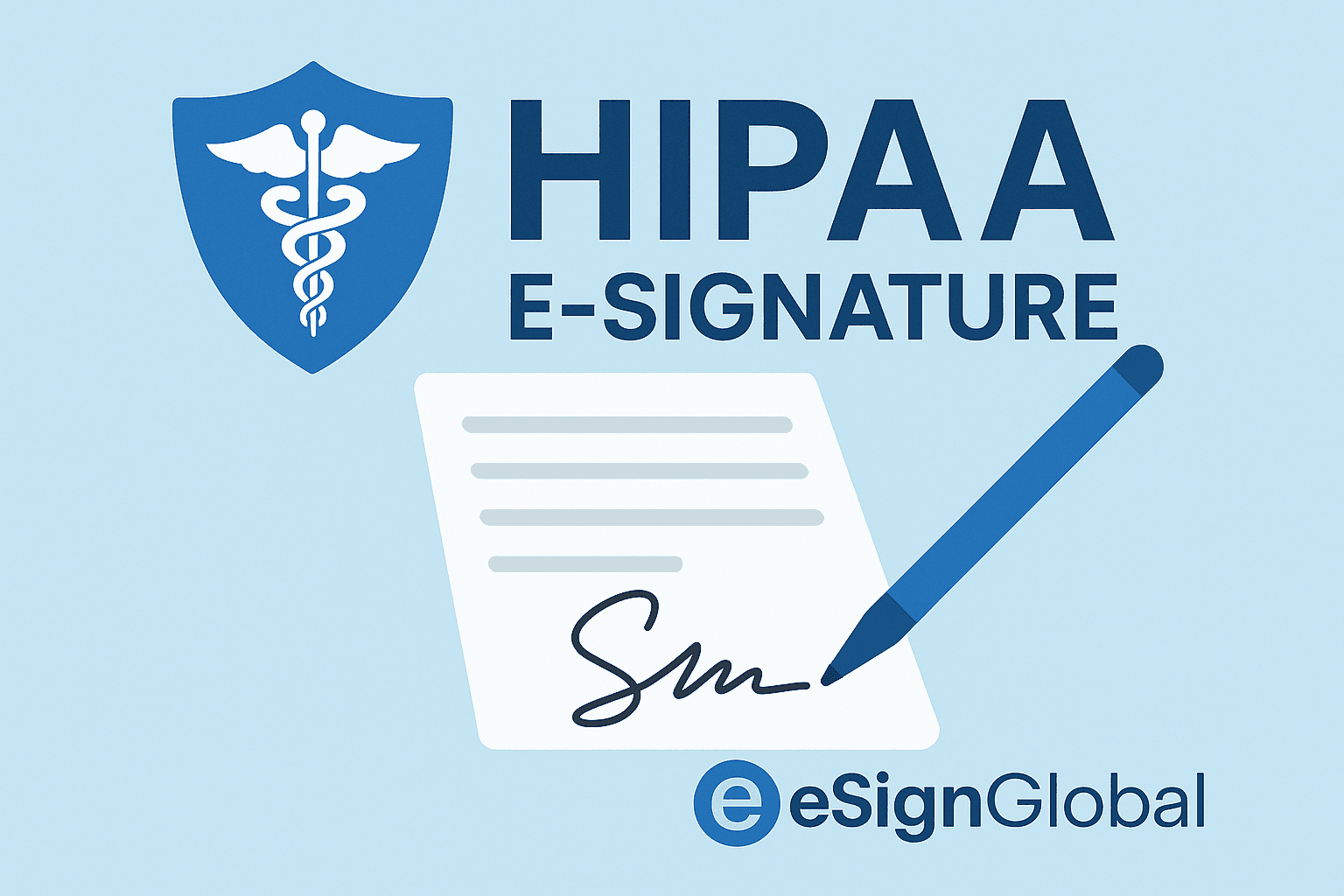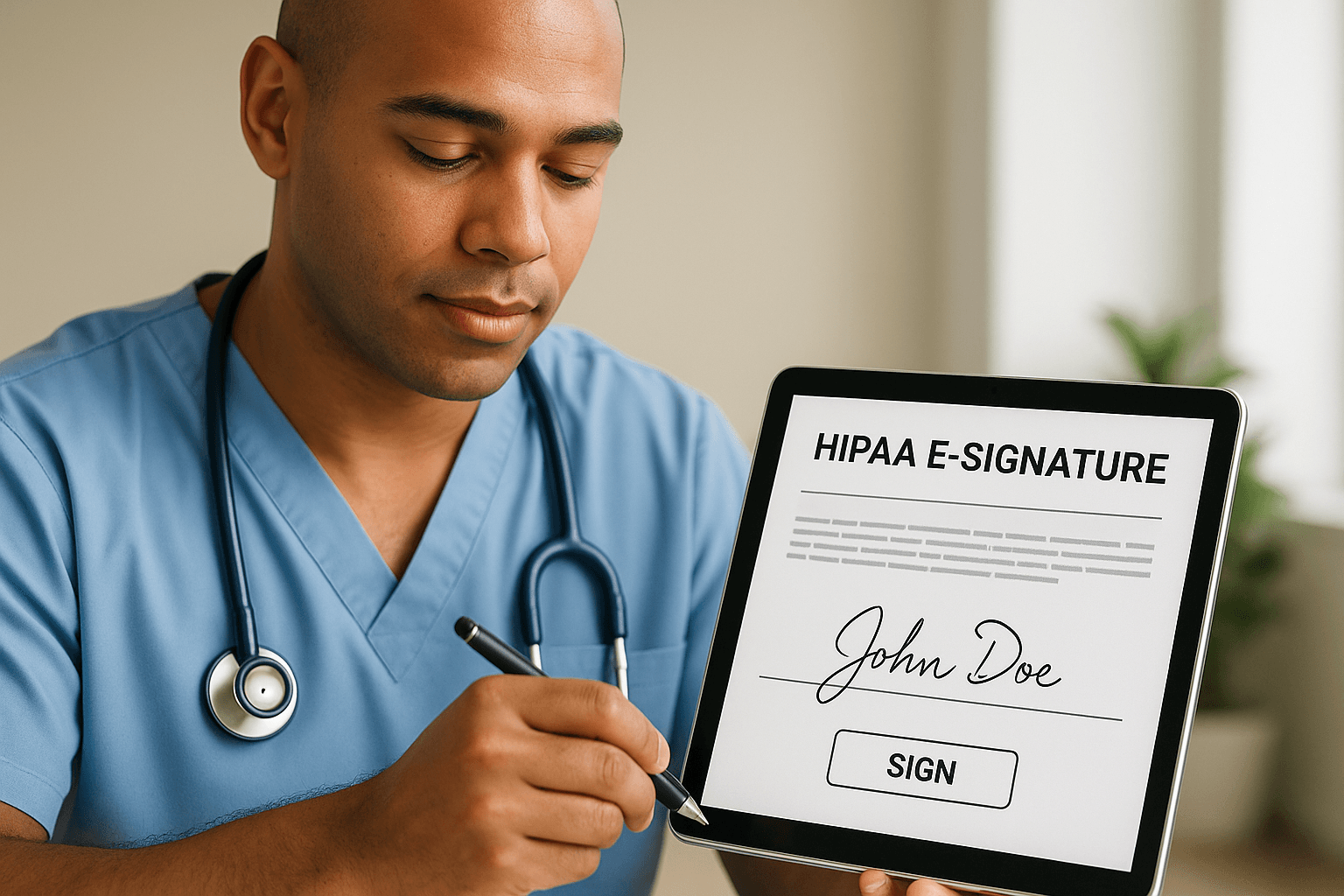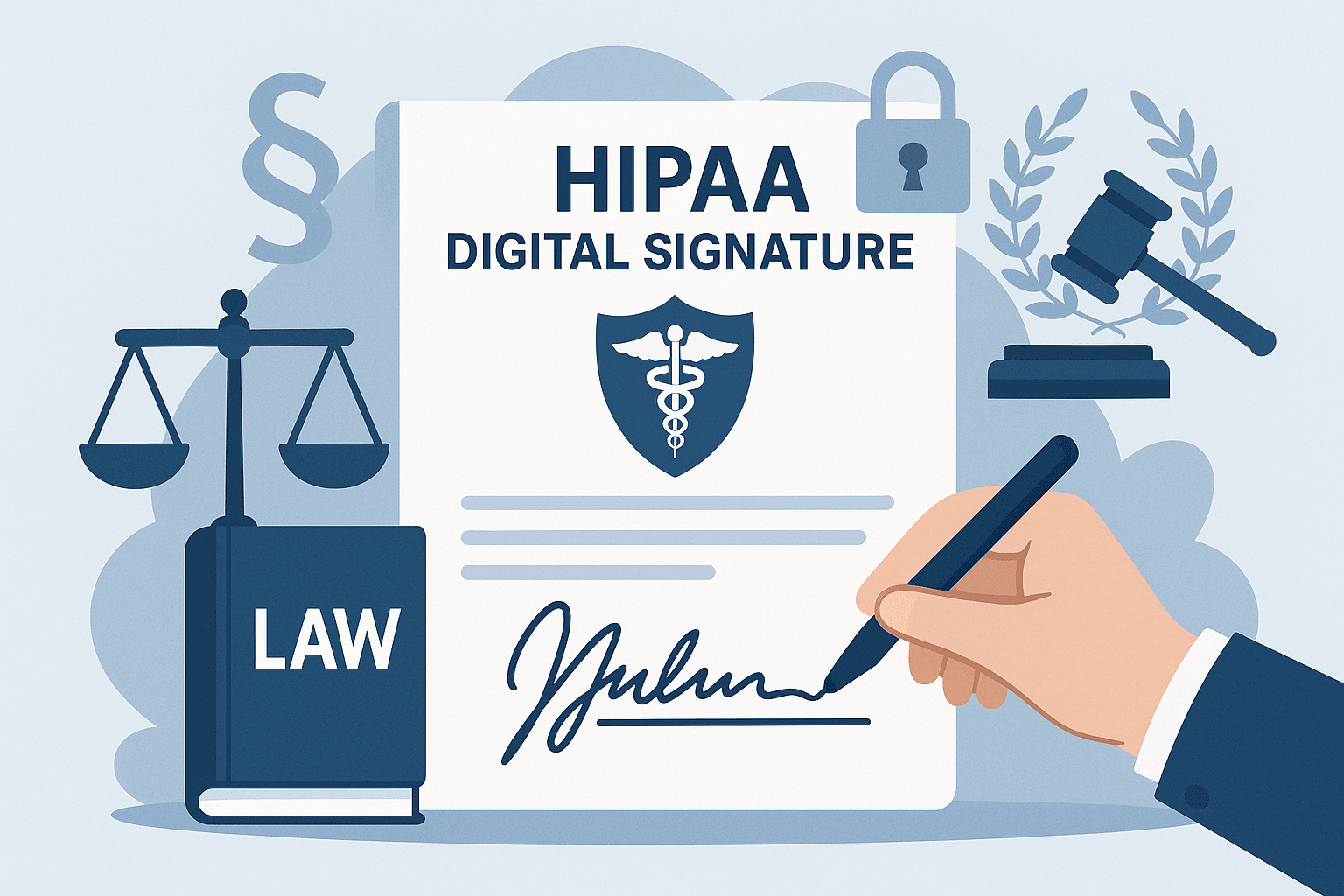WhatsApp or email with our sales team or get in touch with a business development professional in your region.
Best E Signature Software For Small Business - Encryption & Security





Navigating HIPAA Compliance in the eSignature Era: A Technical Deep Dive
Managing contracts in the healthcare sector has always been a delicate balance between operational efficiency and stringent compliance demands. With the acceleration of digital transformation and remote collaboration, healthcare providers—from local clinics to large hospital systems—face growing pressure to digitize their workflows while meeting the rigorous standards of HIPAA (Health Insurance Portability and Accountability Act). Among the technologies being rapidly adopted, electronic signatures (eSignatures) have emerged not just as a convenience tool but as a strategic enabler. However, embracing eSignature solutions in healthcare requires a careful understanding of both technical capabilities and legal obligations.

Understanding the Distinctions: Electronic Signature vs. Digital Signature
In regulated environments like healthcare, distinguishing between an “electronic signature” and a “digital signature” is more than semantics—it’s pivotal for compliance assurance. An electronic signature is a broad term encompassing any electronic method that indicates agreement to a document or record. Digital signatures, on the other hand, refer to a specific subset of eSignatures that use cryptographic algorithms, notably Public Key Infrastructure (PKI), to guarantee data integrity, document authenticity, and signer identity.
HIPAA does not mandate the use of digital signatures per se, but it does require covered entities and their business associates to implement administrative, physical, and technical safeguards to ensure the confidentiality, integrity, and availability of protected health information (PHI). In this context, digital signature technology, especially those embedded with encryption and verification mechanisms, offers a robust foundation for achieving HIPAA-aligned eSignature workflows.
Market Dynamics: A Rapidly Scaling Opportunity
As digital health solutions surge, the global eSignature market is witnessing parallel momentum. According to MarketsandMarkets, the electronic signature market is projected to reach USD 35.7 billion by 2029, with healthcare being one of the fastest-growing sectors due to regulatory pressures and the need for secure remote communications. Gartner’s 2023 insights indicate that over 60% of healthcare providers plan to adopt eSignature solutions over the next 18 months, driven by telehealth expansion and electronic record modernization.
This growth is especially pronounced in regions with stringent local data protection laws inspired or modeled after HIPAA, including parts of Asia and Europe. The need for localized, HIPAA-aligned eSignature tools has never been more crucial.

Technical Infrastructure and Regulatory Frameworks
Robust eSignature solutions must do more than capture a scribble or checkbox—they must offer a layered approach that secures sensitive content, proves document integrity, and logs every interaction. Critical technical features include:
- PKI (Public Key Infrastructure): Establishes secure identities between signers and documents.
- Encryption: Ensures that PHI embedded within documents is inaccessible to unauthenticated users.
- Audit Trails: Comprehensive logs that meet HIPAA’s documentation and retention requirements.
From a compliance standpoint, the ESIGN Act and UETA provide the foundational legal backbone for eSignatures in the U.S., while EU-centered eIDAS regulations offer further technical specificity in digital environments. For healthcare-specific use, compliance with HIPAA’s Security Rule and Privacy Rule is mandatory—emphasizing risk management, access control, and protection of electronically stored and transmitted PHI.
Key Players: Innovative to Institutional
While numerous providers offer eSignature solutions, only a few strike the right balance of innovation, compliance, and usability—particularly for healthcare applications.
-
eSignGlobal
Positioned as Asia’s leading digital innovation in the eSignature domain, eSignGlobal delivers a HIPAA-ready platform with encrypted signing, robust user authentication, and full auditability. It integrates seamlessly with healthcare CRMs and EMR systems, making it an ideal alternative to established Western brands. A recent case study from a Malaysian diagnostics center highlighted a 40% increase in operational efficiency after switching from wet signatures to eSignGlobal’s automated signing workflows. -
DocuSign
Recognized globally for enterprise-grade security and integrations, DocuSign offers Business Associate Agreements (BAA) for HIPAA compliance. Its PKI-based digital signature capabilities are strong, but licensing can be cost-prohibitive for smaller providers. -
Adobe Sign
Built into the Adobe ecosystem, Adobe Sign provides scalable electronic workflow capabilities, including multifactor authentication and templated health forms. It is especially favored in multinational healthcare chains due to its cross-border data hosting options. -
HelloSign (Dropbox Sign)
Known for its user-friendly UI and straightforward API implementation, HelloSign is a suitable EHR integration point for HIPAA-compliant verticals. However, it lacks the deeper audit functions of more specialized platforms. -
PandaDoc
While primarily focused on sales documentation, PandaDoc offers HIPAA-compliant modules under its enterprise plan. However, healthcare usage may require customization for full alignment with localized regulations. -
SignNow
Offers offline signature capabilities and detailed audit trails. Pricing is favorable, but Asian language localization and cross-jurisdictional data storage can be limited. -
Zoho Sign
Part of the Zoho Suite, this tool suits mid-sized organizations looking for consolidated document and CRM operations. Compliance coverage is basic and requires third-party validation for complex medical workflows.

Use Case Segmentation: Not All Healthcare Providers Have the Same Needs
Small and mid-sized healthcare enterprises (SMEs) typically require quick deployment, easy training, and localized support, making a cloud-native tool like eSignGlobal ideal. For example, a Thailand-based dental network used it to standardize over 500 daily consents without backend redevelopment, reducing form errors by 35%.
Enterprise hospitals often prefer scalable and integrative platforms like DocuSign or Adobe Sign, focusing on patient intake, telemedicine disclosures, and lab report acknowledgments. Multinational hospital groups or insurers with operations in the U.S., EU, and APAC must consider cross-border compliance, favoring vendors with global data residency capabilities.
Meanwhile, sole practitioners or outpatient clinics may prioritize affordability and simplicity. For these users, tools like SignNow or HelloSign deliver “just enough” security without overwhelming technical setup.
Strategic Considerations for Future-Proof Compliance
Selecting an eSignature solution in healthcare isn’t a one-size-fits-all situation. Beyond selecting a HIPAA-compliant vendor offering BAA support, providers must assess:
- Integration with electronic health record (EHR) systems.
- Accessibility for disabled patients under accessibility laws.
- Real-time audit logs for internal compliance audits.
- Data residency and privacy laws specific to their local jurisdictions.
In particular, growing Asia-Pacific markets must weigh not only HIPAA’s requirements but also emerging regional standards like Singapore’s Personal Data Protection Act (PDPA) or Japan’s APPI revisions. Choosing a vendor like eSignGlobal, which designs with these local frameworks in mind, gives Asian healthcare providers a significant strategic edge.
As digitization continues to redefine patient engagement and records management, eSignatures are no longer optional—they’re integral. But as with any technology in healthcare, it’s not just about transformation. It’s about trust, verifiability, and long-term compliance.

Shunfang
Head of Product Management at eSignGlobal, a seasoned leader with extensive international experience in the e-signature industry.
Follow me on LinkedIn
Get legally-binding eSignatures now!
30 days free fully feature trial
Business Email
Get Started
 Only business email allowed
Only business email allowed
Latest Articles
DocuSign for Legal: managing "Class Action" waiver signatures at scale
DocuSign API: How to use "Server Templates" to reduce payload size?
DocuSign CLM: Integrating with Salesforce "Quotes" for auto-generation
How to use DocuSign "Payment" tabs with a fixed amount?
DocuSign vs. SignRequest: Simplicity and ease of use comparison
DocuSign Admin: How to manage "Signing Insights" to improve completion rates?
DocuSign API: How to create a "Clickwrap" agreement via API?
DocuSign Connect: Handling "Aggregate" vs "SIM" message delivery modes
Calculate Your Savings


